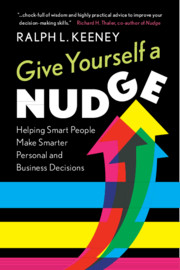Refine search
Actions for selected content:
2 results
1 - Nudge Yourself to Make Better Decisions
-
- Book:
- Give Yourself a Nudge
- Published online:
- 17 April 2020
- Print publication:
- 23 April 2020, pp 1-9
-
- Chapter
- Export citation

Give Yourself a Nudge
- Helping Smart People Make Smarter Personal and Business Decisions
-
- Published online:
- 17 April 2020
- Print publication:
- 23 April 2020
